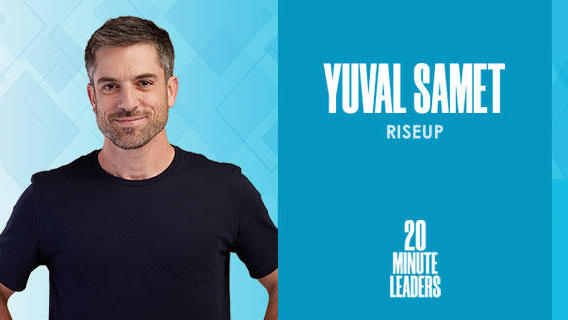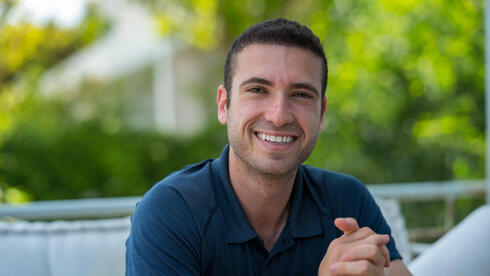
20-Minute Leaders
“The zip code you are born in doesn't need to dictate the trajectory of your life.”
Though people are often willing to take steps to improve their health, they don’t usually do much to reach financial well-being, says Yuval Samet, CEO of RiseUp.
Though people are often willing to take steps to improve their health, they don’t usually do much to reach financial well-being, says Yuval Samet, CEO of RiseUp. He argues that financial well-being is the foundation of overall well-being. RiseUp is helping people find the confidence to make good money decisions by connecting to their financial data, showing them areas to improve, providing community support, and making it enjoyable. Samet shares that he grew up with financial hardship, and he believes that the place you grew up doesn’t have to set the course for your life. He explains that it used to be hard to admit that his story was part of the company’s story. As CEO, Samet says building a team that’s aligned and inspired is the biggest difficulty. He shares that starting a company is not always fun, but he feels up to the challenge.
Click Here For More 20MinuteLeaders
Tell me a little bit about your relationship with the entrepreneurial landscape.
Honestly, it is a little bit difficult for me to track back when it actually started, the entrepreneurship bug. It was almost always there. I got the present of believing that everything is possible from my mother and the present of creativity from my father. I guess it is somehow really ingrained in my DNA. My brothers are financial services entrepreneurs as well.
I think that it is something about the small apartment in the town of Petah Tikva that really taught us entrepreneurship. We grew up with financial hardship at home, but we did find the path of creativity. Our parents really taught us how to impact others.
My mother was born in a tent camp. My father came from Poland. They did not have any safety network. They worked really hard to provide for us and educate us. It really made me believe that it doesn't matter which zip code you are born in, it doesn't need to dictate the trajectory of your life. It made me the entrepreneur I am today that really believes that everything is possible and you really own your own destiny as long as you have a high level of self-efficacy.
When you start a company, it is sometimes hard to admit that the company's story is somewhat your own story. But now I know that my story is really a deep part of RiseUp. In the early days of the company, it was much more difficult for me to admit.
What was the difficulty there?
I did not want to put myself in the middle. I did not want to be the rock star ninja entrepreneur, that founder that is really narcissistic about his path. I have co-founders, Tamara and Yeftah, who are absolutely amazing. I really did not want it to be a Yuval story. I still don't think RiseUp is a Yuval story.
Let's dive into RiseUp.
Let's do a quick quiz. So have you ever eaten kale?
Oh, I love kale.
Do you like quinoa?
I love quinoa.
Have you ever taken an icy bath, like Wim Hof?
I did one just five days ago for the first time. I feel like I'm ruining the quiz.
Actually, your answers are brilliant. People do crazy things nowadays in order to reach well-being in their life, to achieve some headspace. However, people do very little in order to achieve financial well-being, which I claim is the basis for well-being.
RiseUp is all about making it easy and enjoyable for anyone to achieve financial well-being. The way we do it is by connecting to your bank account and credit card data, aggregating it, slicing and dicing it, and identifying the things you should be concerned about and helping you to switch them to a point of confidence. We are working to be the leaders of the financial well-being revolution that we believe is happening. One domain that is not yet disrupted by well-being is financial services. Still people that make a reasonable salary find it really hard to build financial well-being on their own.
Why is it so hard?
I think that money is self-efficacy. Being good with money and using money as an enabler for a better life or well-being really is much more related to whether you are optimistic toward the challenge or not. Most people don't have the knowledge, the access, and the humility, passion, and perseverance to stay on a certain path, with a certain strategy all the time. Most people live in scarcity when it comes to money. Most people feel stressed about money. It doesn't matter if they work for a high tech company or they have a fantastic stable income, they can experience money as a very stressful thing. When people are stressed, the cortex goes to sleep, and you become very emotional with your decision making.
It makes it incredibly hard to be good with money. The Vanguard people have a saying that I really like. In order to be good with money, you need to do two things that most people really suck at: you need to be humble and learn all the time, and you need to have a strategy that you execute all the time on. I believe that the power of technology, making it very easy; the power of a support circle, a community that shows you people like you, make it easier; and also, entertaining content, make it something that is not painful to do: those are the things that you need to enable in order to help people become better with money. It's not about financial literacy; it's about providing the tools that are effective to enjoy the financial services that are becoming really a commodity.
What insights over the last several years running RiseUp have you learned about people that helped you on how you can help all of us?
First of all, the realization that it's a self-efficacy challenge more than an objective financial issue is really the core of the theory of change of our product activity model. The psychologist Albert Bandura is the one that came up with the self-efficacy theory, and he described four components that build self-efficacy: sense of support, sense of control, individual success, and watching people like you succeed because the way we learn as human beings is by observing people like us. The realization that you can really build self-efficacy is a fundamental understanding of what we do at RiseUp.
Let me exemplify the things that are unique realizations, insights that we really needed to build RiseUp in order to understand. We looked at a segment of customers that are very successful with us, and you learn that they are a part of our Facebook group, what we call our community. Paying customers that participate in the group are three times more likely to be successful. Another insight is that households that have two adults in the household, if both of them are members of the service, it increases the probability of success by five times. These are the types of things that you would never consider as the main levers for being successful. This is why I'm so enthusiastic about community as a core thing that we do.
Tell me about yourself as a leader. What have you discovered about yourself?
When we started RiseUp, someone asked me what is the thing I find most concerning when building a company again. I quoted Patrick Lencioni, the author of The Five Dysfunctions of a Team. He speaks about the fact that if you manage to put every team in a boat rowing in the same direction, you will win any competition in any market at any time. I think that building a team that is aligned and feels empowered and inspired to act on the mission of the company is always the biggest challenge. I absolutely respect the fact that whenever you build the team, even if it is the 200th team that you build, still you need to invest as much in the teamwork in order to make it work really well.
Are you having fun?
Wow. Type two fun. It's like climbing a mountain. In retrospect, it is fun. I do feel in my flow there is a good match between the skills I have and the challenges we meet, but I cannot say that every day is 100% fun. It is not supposed to be fun all the time. If you are all about doing fun, don't start a company, especially not in FinTech.
Michael Matias, Forbes 30 Under 30, is a Venture Fellow at Innovation Endeavors as well as investment Venture Partner at Secret Chord and J-Ventures. He studies Artificial Intelligence and Human-Computer Interaction at Stanford University, and was an engineer at Hippo Insurance. Matias previously served as an officer in the 8200 unit. 20MinuteLeaders is a tech entrepreneurship interview series featuring one-on-one interviews with fascinating founders, innovators and thought leaders sharing their journeys and experiences.
Contributing editors: Michael Matias, Megan Ryan
